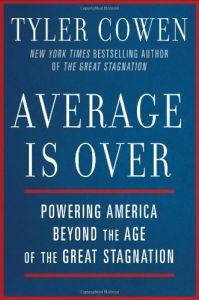Join getAbstract to access the summary!

Join getAbstract to access the summary!
Tyler Cowen
Average Is Over
Powering America Beyond the Age of the Great Stagnation
Dutton, 2013
What's inside?
Good enough is no longer good enough. Economic rewards accrue to the smartest and most skilled.
Recommendation
The great “hollowing out” of the US economy is no mirage. That most Americans are falling behind is a measurable trend. Prominent economist Tyler Cowen lays out the details in this compelling read. Cowen doesn’t expect robots to take your job, but he is a realist and warns that those US workers who lack specialized skills and educational credentials face a downwardly mobile future. His conclusions align more closely with today’s economy than when he first published this report in 2013. getAbstract recommends Cowen’s engaging study to employees, employers, investors and policy makers seeking insight into fast-changing labor markets.
Summary
About the Author
Tyler Cowen is a professor of economics at George Mason University. He writes the Marginal Revolution blog. His previous books include The Great Stagnation and The Age of the Infovore.


















Comment on this summary